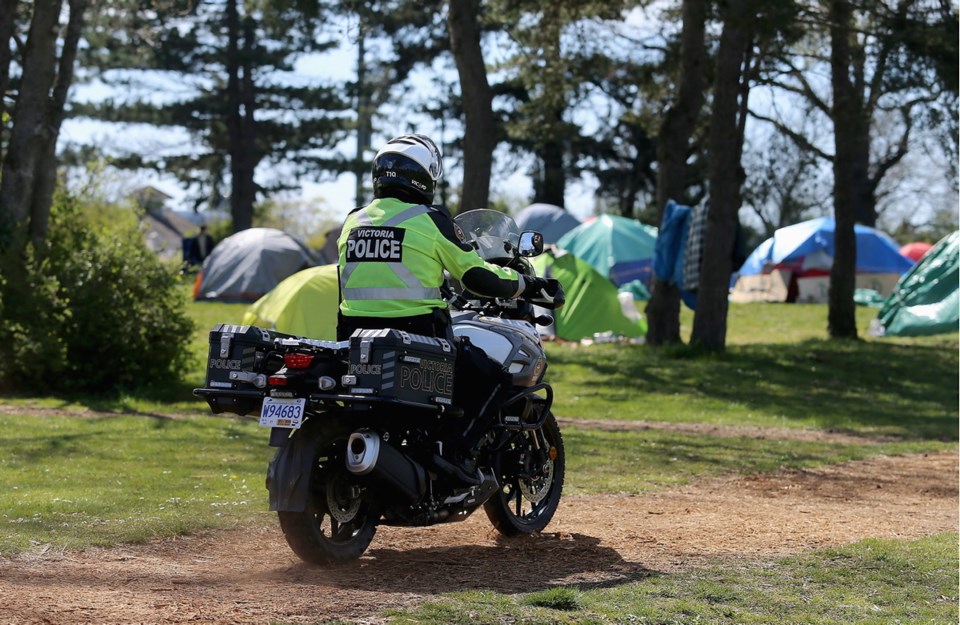The deaths of two homeless men sheltering in the tent city at Topaz Park have devastated staff, outreach workers and residents, shelter manager Kelly Roth said Thursday.
“And it’s not like this is something we haven’t dealt with,” said Roth, executive director of the Greater Victoria Coalition to End Homelessness. “We have an opioid crisis, on top of a homeless crisis, on top of a COVID-19 crisis. Pick a crisis and pick a piece to respond to. This is what we’re trying to deal with every day.”
The B.C. Coroners Service confirmed that a man in his 60s and a man in his mid-20s died at the tent city on Wednesday. Victoria police confirmed the deaths are not suspicious.
The coroners service is also investigating two deaths in the tent city on Pandora Avenue. One man in his late 50s died on April 8, while a man in his late 30s died on April 16.
Following the deaths, support workers and staff put a naloxone kit in each of the 200 tents at Topaz Park. (Naloxone can reverse the effects of an opioid overdose.) Staff began checking on residents every two hours.
Still, at about 1 p.m. on Thursday, two ambulances, a police van and a fire truck raced to the tent city to revive at least one man from an overdose.
“There are bad drugs on the street,” Roth said.
“There always is. There is a safe supply of drugs, but there’s never enough and the doctors are working hard on that, too.”
Non-profit agencies have been warning about the potential for a spike in overdoses and calling on the government to accelerate access to a safe supply of drugs.
The B.C. government released new clinical guidelines last month that allow people who use drugs to obtain prescription pharmaceuticals from a doctor or nurse practitioner. The guidelines recognize that the province is dealing with two public-health emergencies — a pandemic as well as a drug-overdose crisis — and that it’s difficult for people who rely on illicit drugs to keep their distance from others to avoid spreading COVID-19.
There’s a recognition, as well, that the pandemic and resulting border closures have disrupted the supply of illicit drugs and that those on the street are more adulterated than usual.
But while health professionals and community groups welcome the new guidelines, they say people are still having difficulty getting access to a safe supply. In some cases, people who use drugs might not have a family doctor, or the doctor might be unable to take on the work involved.
“I’ve talked to a number of physicians who are very supportive of the safe-supply approach, but who don’t have the time it would take to support their clients in a proper way,” said Mark Willson, spokesman for the SOLID Outreach Society, an education and advocacy group.
Bernie Pauly, professor of nursing at the University of Victoria, called for an implementation plan and more resources so nurses or people with drug-use experience could share some of the workload. “It’s amazing that we have this provincial guideline for safe supply, but that’s not enough,” she said. “We have to have the resources and the infrastructure to deliver it to people.”
Victoria Police Chief Del Manak said the disruption to the drug supply chain has doubled the price of drugs on the street, forcing already desperate people to commit more crimes to support their addiction.
“I think that if you introduce a safer supply and you take away the need for people to commit survival crime, it actually helps the whole community,” he said.
“It helps the individuals themselves be more stable. Obviously, it restricts them from overdosing, because you’re being given a safe supply instead of illicit drugs on the street, which can be very deadly and dangerous.”
Katrina Jensen, executive director of AVI, says her organization is receiving daily requests from people seeking safe drug options. But she said there needs to be a delivery model that both works for doctors and draws on the experience of people who use illicit drugs.
“And we need that now,” she said. “We need to sort of be scaling this up as quickly as we can.”
Judy Darcy, B.C.’s minister for mental health and addictions, said the government is going to great lengths to make sure that every physician, nurse practitioner and pharmacist, as well as every person who uses drugs, is aware of the new guidelines.
In addition, the B.C. Centre on Substance Use has been holding webinars with doctors and nurses, and there’s a 24-hour line that doctors can call to get advice from an addictions specialist, she said.
Darcy said the province had started to see a decline in overdose deaths across the province prior to the outbreak. “With the COVID pandemic on top of the first public-health emergency, we’re very concerned that the death toll will start to go up again, and that’s why we’re just working flat out to try and prevent that from happening.”
Darcy said it’s too early to know whether there has been an increase in deaths or how many people are taking advantage of the new guidelines to access a safe supply of drugs.
“We’re really pouring it on, on a lot of fronts, in order to get the word out as widely as possible and to provide the greatest possible access to safe prescription alternatives to a poisoned drug supply,” she said.



